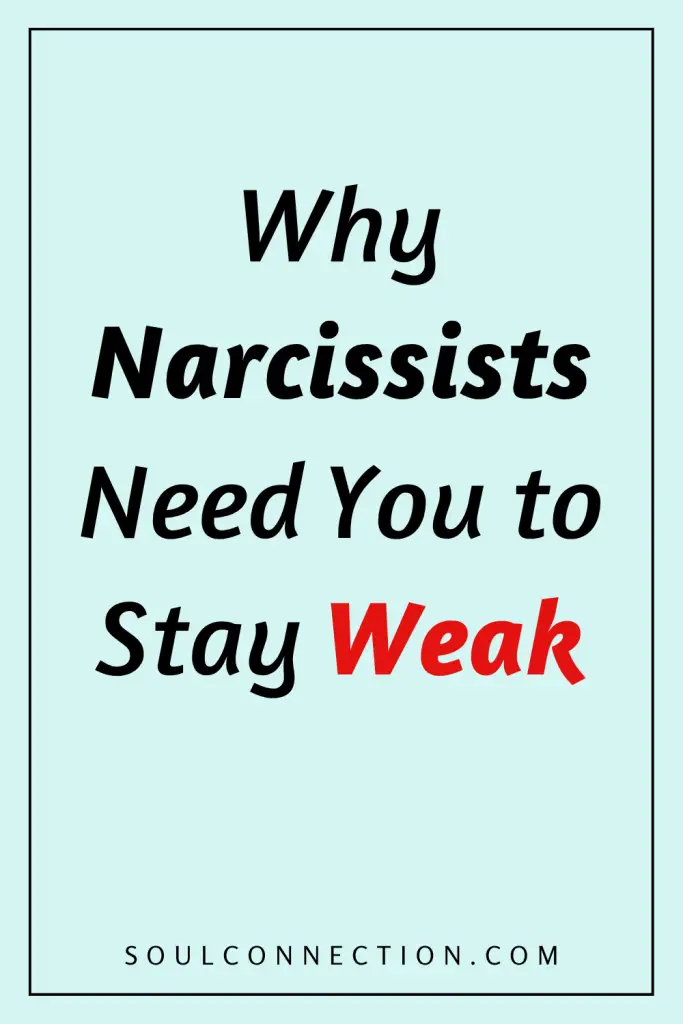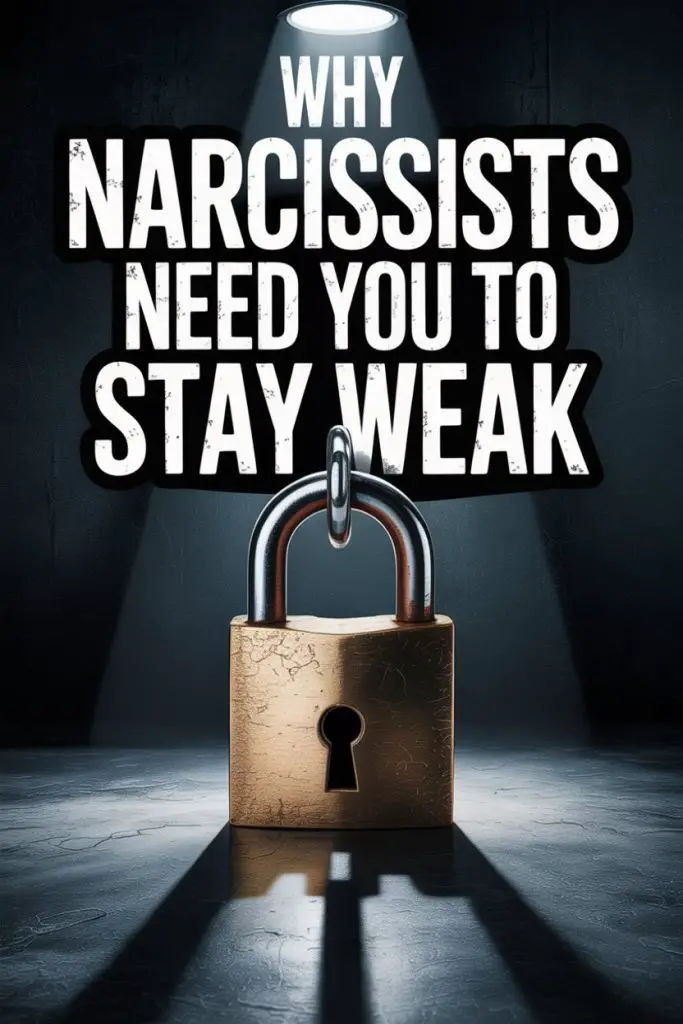Narcissists are drawn to weakness like seagulls to chips.
If you’ve ever felt mysteriously depleted around someone, only to be called “too sensitive” for mentioning it, you might just be brushing up against a narcissist’s favorite game: keeping you off balance, unsure, and stuck at the bottom of the confidence ladder.
But why, exactly, do narcissists need you to stay weak? Grab a cuppa—figuratively, not literally, legal says—and let’s unravel this quietly toxic dance.
Power Feeds the Beast
Narcissists crave control the way some of us crave carbs after 9pm. Their entire sense of self relies on controlling others’ perceptions, emotions, and sometimes even their time.
Whenever you start asserting your needs or boundaries, it’s like you just trampled over their sandcastle.
When you’re weak—hesitant, self-doubting, or always seeking approval—they know they can steer the ship. A strong, self-assured partner is less likely to fall for gaslighting or manipulation.
Weakness, in their eyes, means easier access to the driver’s seat.
The Delicate Art of Supply
You’ve likely heard about “narcissistic supply”—that endless hunger for validation and attention. Think of it as a bottomless pit with a fancy Instagram filter.
A strong, self-confident person might challenge a narcissist, question their narrative, or—heaven forbid—ignore them altogether. A weaker partner, on the other hand, is more willing to shower praise, walk on eggshells, and prioritize the narcissist’s needs over their own.
Weakness, to a narcissist, means a steady drip-feed of ego boosts. Why risk the supply drying up?
Gaslighting Works Best on Shaky Ground
Confident people check facts. They trust their gut. Someone who’s been worn down—who second-guesses their own memory or emotions—offers fertile ground for gaslighting.
Narcissists are master illusionists, twisting your recollections until you’re not sure if you forgot the milk or the last three years of your life. Keeping you weak makes their tricks easier.
If you’re strong, you might stand your ground and say, “Nice try, but I know what happened.” Can’t have that, can we?
Isolation Is Easier With a Weaker Partner
Narcissists thrive when you’re cut off from your support network. If you’re already feeling weak or unworthy, you’re more likely to accept their subtle digs about your friends, or give in when they “suggest” you spend more time together (translation: with no one else).
A strong partner with a healthy social circle is much harder to isolate. Keeping you weak makes it easier for the narcissist to become your entire world—and to spin the narrative any way they like.
Keeps the Blame Game Running Smoothly
No one spins a story quite like a narcissist when it’s time to dodge accountability. When you’re uncertain or routinely second-guessing yourself, you’re more likely to shoulder the blame for their moods, mistakes, or even their cheating ex “who drove them to it.”
A weak partner absorbs the guilt and tries harder. A strong partner? Not so much—they might even start expecting apologies. And nobody wants to see a narcissist forced into that performance.
Empathy Becomes a Weapon
Narcissists often spot your empathy from a mile off. If you’re a natural fixer, giver, or peacemaker, they’ll lean in—hard. They may even crank up the vulnerability: cue tragic backstories about “no one ever understanding them.”
While empathy is a beautiful trait, a narcissist exploits it most efficiently when you’re too self-doubting to set boundaries.
The weaker you feel, the more you’ll try to heal or save them, keeping the cycle alive. (Spoiler: there’s always another crisis with a narcissist.)
Change Feels Impossible When You’re Drained
If you’re exhausted, anxious, or convinced “it’s all your fault,” making changes in the relationship feels like climbing Everest in flip-flops. Narcissists know that a tired, discouraged partner is less likely to question the status quo or take bold steps out the door.
When you regain strength, suddenly the cracks become visible. You start asking for respect, or at the very least, a night out with your mates without a guilt trip. That’s the narcissist’s worst nightmare.
Control Disguised as Care
Narcissists can be charmingly “concerned” about your choices—who you talk to, what you wear, how late you stay out. At first blush, it’s just protective. Scratch a little deeper, and it’s all about control.
A weak partner is more likely to interpret these red flags as love. A strong one sees the manipulation and says, “Thanks, but I’ll decide for myself.” Keeping you insecure makes you more susceptible to their “advice.”
The Cycle of Drama Needs a Low-Energy Partner
Narcissistic relationships run on drama—arguments, tearful apologies, love bombing, withdrawal, repeat. If you’re feeling weak, you’re less likely to break the cycle.
You might start to believe the highs and lows are your fault. A strong, self-possessed partner is more likely to call time on the emotional rollercoaster. That’s bad news for someone whose self-esteem depends on keeping you guessing.
Growth Is a Threat
Personal growth—new hobbies, therapy, a new haircut, or even just reading self-help books—signals danger to a narcissist. It means you might see them more clearly, recognize their tactics, or even (gasp) leave.
If you’re weak, you’re less likely to invest in yourself. You’re too busy managing their moods, walking on eggshells, and trying to stay afloat.
Growth gives you options. Narcissists need you to feel like you have none.
Spotting the Subtle Sabotage
Narcissists rarely say, “Please remain weak so I can control you.” Instead, you’ll notice a pattern: they might “forget” to celebrate your wins, criticize your confidence, or sabotage your big moments.
If you suddenly feel small or foolish after sharing your excitement, that’s not an accident.
Strength threatens their grip. The more you shrink, the bigger and more important they feel.
Reclaiming Your Strength Tonight
If your inner alarm bells are ringing, trust them. Building strength starts with tiny acts, not grand declarations.
Start by noticing what makes you feel drained or doubting. Are there certain topics where you always end up apologizing? Do you feel nervous expressing your needs?
Awareness is the first green shoot of strength.
Next, connect with someone outside the relationship—a mate, therapist, or even a group chat full of supportive strangers. Social support works wonders on self-doubt.
Set one small boundary. Maybe you decide to spend the evening how you want, or you keep a win to yourself instead of sharing it for validation. Every boundary is a brick in your new foundation.
Narcissists may push back when you start growing. Expect it, and hold the line. Their discomfort is not your responsibility.
Self-care isn’t selfish. If your hobbies have vanished, dust one off, even if it’s just for ten minutes. Strength grows in the micro-moments.
Your Strength Is the Exit Sign
Narcissists need you to stay weak because it keeps you easier to control, easier to blame, and easier to keep in their orbit. The stronger you become, the less power they hold.
You deserve partners who celebrate your growth, not shrink from it. Confidence and boundaries are the best repellents for manipulation.
Tonight, do just one thing that makes you feel powerful—your future self will thank you for it.
And if you’re already out, or figuring your way out, give yourself credit for every inch of ground regained. Narcissists hate strength for a reason: it’s the one thing they can’t steal.


